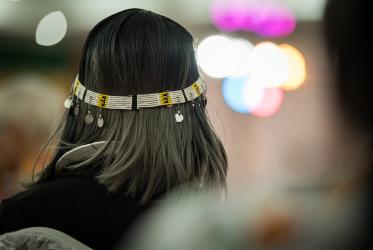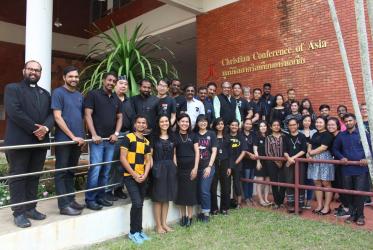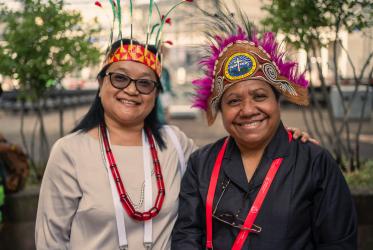In a recent consultation in the Philippines, indigenous theologians and representatives from various continents have vowed to strengthen their solidarity in continuing a dialogue with each other and with the World Council of Churches (WCC) in envisioning a more inclusive church and society.
"This consultation is a first step by which churches within the WCC family can understand, appreciate and receive the rich theological heritage of indigenous peoples," said Deenabandhu Manchala, WCC programme executive for just and inclusive communities.
More than thirty indigenous theologians and community leaders from 16 countries from Asia, Latin America, North America and Europe met in the northern Philippine mountain city of Baguio, 21 to 26 October. They shared their worldviews, spirituality, tradition and culture, as well as stories about their struggles against colonization and today's market-driven globalization.
Organized by the WCC programme for just and inclusive communities and hosted by the National Council of Churches in the Philippines (NCCP), the consultation on "ecclesial and social visions of indigenous peoples" enabled participants to synthesize their insights around five themes: indigenous theology, land and life, self-identity and self-determination, solidarity network of indigenous peoples, and globalization.
Fr. Rex Reyes, NCCP general secretary, described the consultation as "historically significant" as it paved the way for a global solidarity network of indigenous theologians and indigenous leaders and representatives who have pledged to help enrich the Christian gospel with their cultural and religious heritage.
In a statement, participants expressed solidarity with the 10 million Philippine indigenous peoples, many of whom suffer, being displaced by destructive industries such as big-scale mining, the conversion of indigenous lands into bio-fuel plantations, and logging.
Participants appealed to the Philippine authorities to free James Balao. An indigenous leader, Balao was reportedly abducted by alleged military and police forces on 17 September and has since remained missing.
The consultation fulfils a recommendation from the WCC 9th Assembly in Porto Alegre, Brazil. The output of the consultation and the ensuing dialogue is expected to feed into the International Ecumenical Peace Convocation that will mark the culmination of the WCC-sponsored Decade to Overcome Violence.
WCC work on just and inclusive communities







